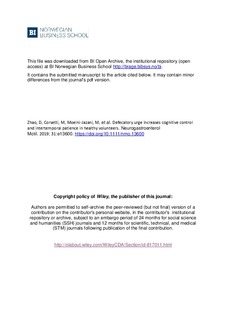Defecatory urge increases cognitive control and intertemporal patience in healthy volunteers
Zhao, Dongxing; Corsetti, Maura; Moeini-Jazani, Mehrad; Weltens, Nathalie; Tuk, Mirjam A.; Tack, Jan; Warlop, Luk; Van Oudenhove, Lukas
Journal article, Peer reviewed
Submitted version
Permanent lenke
http://hdl.handle.net/11250/2610515Utgivelsesdato
2019Metadata
Vis full innførselSamlinger
- Publikasjoner fra CRIStin - BI [1015]
- Scientific articles [2173]
Sammendrag
Past research has demonstrated that moderate urge to urinate improves inhibitory control, specifically among participants with higher behavioral inhibition sensitivity system (BIS), and the effect was absent when the urge exceeded intolerable level. The present research examines whether rectal distension-induced urge to defecate has similar effects. Moderate and high defecatory urge was induced by rectal distension in healthy volunteers (n=35), while they completed Stroop tasks and monetary delay discounting tasks. The difference of average reaction time between incongruent and congruent trials in the Stroop task (Stroop interference) and the preference for larger-later rewards in the delay discounting tasks were analyzed as the primary outcomes. Participants with high BIS sensitivity (n=17) showed greater ability to inhibit their automatic response tendencies, as indexed by their Stroop interference, under moderate-urge relative to no-urge condition (128±41 ms vs. 202±37 ms, t64=-2.07; p=0.021, Cohen’s d: -0.44), but not relative to high-urge condition (154±45 ms, t64=-1.20; p=0.12, Cohen’s d: -0.30). High-BIS participants also showed higher preference for larger-later reward in the delay discounting task under high (odds ratio = 1.51 [1.02–2.25], p=0.039) relative to no-urge condition, but not relative to moderate-urge condition (odds ratio = 1.02 [0.73–1.42], p = 0.91) In contrast, rectal distension did not influence performance on either of the tasks for participants with low BIS sensitivity (n=18). These findings may be interpreted as a ‘spill-over’ effect of inhibition of the urge to defecate to volitional cognitive control among healthy participants with high BIS sensitivity.
